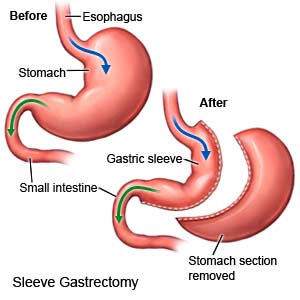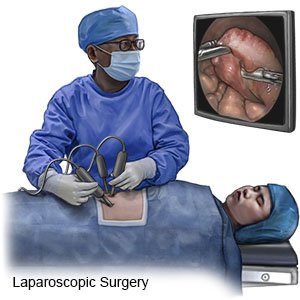Laparoscopic Sleeve Gastrectomy
Medically reviewed by Drugs.com. Last updated on Apr 2, 2024.
What do I need to know about laparoscopic sleeve gastrectomy (LSG)?
LSG is surgery to remove most of your stomach. The remaining stomach forms a tube or sleeve. You will feel full faster and have a decreased desire for food.
 |
What do I need to know before I have a sleeve gastrectomy?
- You will work closely with a dietitian before and after surgery. Your dietitian will talk to you about nutrition and what you should eat and drink before and after surgery. You may need to follow a very low-calorie diet for several weeks before surgery. This will help you lose some weight before surgery. Weight loss will help your liver handle anesthesia better. It will also help you create healthy nutrition and activity habits.
- Your surgeon will talk to you about self-care and follow-up activities you will need after surgery. You will need to take vitamins and come in to have your progress checked.
- If you have diabetes, your diabetes medicine needs may change after surgery. This depends on the medicine you take and if you have type 1 or type 2 diabetes. Do not change your diabetes medicine unless directed. Your providers will help you set schedules for checking your blood sugar levels and taking your medicine.
- Your medicine needs may change if you are taking medicine for hypothyroidism. Your healthcare providers will monitor your TSH levels and make medicine changes if needed. Do not change your thyroid medicine unless directed.
- Your surgeon will talk to you about family planning if you are a woman of childbearing age. It is important that you do not get pregnant for 12 to 18 months after surgery. Then your pregnancy will need to be monitored for your safety and your baby's safety. Your provider will tell you how much weight is safe for you to gain during pregnancy. He or she will help you create healthy meal plans so you get the right nutrition without gaining too much weight. If you want to prevent pregnancy, healthcare providers will help you choose the right kind of birth control. You may not be able to use birth control pills because you will not be able to absorb them fully after surgery.
How do I prepare for surgery?
- Your surgeon will talk to you about how to prepare for surgery. He or she may tell you not to eat or drink anything after midnight on the day of your surgery. Arrange to have someone drive you home after you are discharged from the hospital.
- Tell your surgeon about all medicines you currently take. He or she will tell you if you need to stop any medicine for surgery, and when to stop. He or she will tell you which medicines to take or not take on the day of surgery.
- Tell your surgeon about all your allergies, including to anesthesia or antibiotics. You may be given an antibiotic to help prevent a bacterial infection.
- You may need a fasting lipid panel or other blood tests. Your heart may be checked to make sure it is healthy enough for surgery. You may also need tests to check your digestive system.
- If you have diabetes, healthcare providers will help you schedule meals and medicines before surgery. Your A1c level may also be checked.
What will happen during surgery?
- You will be given general anesthesia to keep you asleep and free from pain during surgery. Your surgeon will make 4 to 6 small incisions in your abdomen. He or she will insert small tools through these incisions. He or she will fill your abdomen with gas in order to see your stomach clearly.

- Your surgeon will remove about 75% of your stomach. This will leave a narrow tube (sleeve) for food and liquid to pass through. The sleeve will be secured with staples. Your surgeon will check for any leaks. A drain may be placed near the sleeve to remove extra blood or fluid. The incisions will be closed with medical glue or tape, or stitches.
What should I expect after surgery?
- You will be helped to walk around after surgery to help prevent blood clots.
- Medicines may be given to prevent or treat pain, nausea, or a bacterial infection.
- A nasogastric (NG) tube may be put into your nose and down into your stomach during surgery. The NG tube helps prevent vomiting and may help get your intestines working. The NG tube is usually removed 1 day after surgery.
- If you have a drain in your surgery area, it will be removed when it stops draining blood and fluid. You may have a catheter in your bladder to help drain urine. This is usually removed the day after surgery.
- A test called a contrast swallow may be done the first day after surgery. This test checks for leaks in your stomach. You will be able to have clear liquids once your stomach starts working after surgery and tests show no leaks. You may be given ice chips at first. Then you will get clear liquids such as water, broth, or juice.
What are the risks of LSG surgery?
You may bleed more than expected or develop an infection. Organs near the surgery area may be damaged. During surgery, you may need one large incision instead of several small incisions. A leak may develop along the staple line where it is holding your sleeve closed. This leak can cause a severe infection. You may have nausea, vomiting, or heartburn. You may not lose as much weight as you want or you may gain weight. You may develop a life-threatening blood clot.
Care Agreement
You have the right to help plan your care. Learn about your health condition and how it may be treated. Discuss treatment options with your healthcare providers to decide what care you want to receive. You always have the right to refuse treatment. The above information is an educational aid only. It is not intended as medical advice for individual conditions or treatments. Talk to your doctor, nurse or pharmacist before following any medical regimen to see if it is safe and effective for you.© Copyright Merative 2024 Information is for End User's use only and may not be sold, redistributed or otherwise used for commercial purposes.
Further information
Always consult your healthcare provider to ensure the information displayed on this page applies to your personal circumstances.
